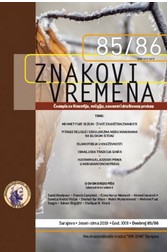Kritika tradicionalizma Seyyed Hossein Nasra
A Critique of Seyyed Hossein Nasr’s Traditionalism
Author(s): Saeid AbedpourSubject(s): Cultural history, Social Philosophy, Islam studies, Philosophy of Religion, Cultural Anthropology / Ethnology, Sociology of Religion
Published by: Naučnoistraživački institut »Ibn Sina«
Keywords: tradition; traditionalism; modern; religion; sublime unity of ideas; Seyyed Hossein Nasr;
Summary/Abstract: Traditionalism is a new idea stream that has emerged in response to the growing modernity of the contemporary world. Traditionalism is more a form of modern ideology than a phenomenon arising from traditional and madhhabic principles and foundations that defines its identity in the form of negation, that is, by negating modernity. The approach to the traditional notion and foundation of traditionalists like Seyyed Hossein Nasra is fundamentally different from the traditional views of thinkers of pre-modern societies. Mostly drawing on modern concepts and notions, by twisting them they tend to form an anti-modernist thought whose characteristics are not quite so in tune with the intellectual relationships and patterns of life of traditional societies. It is exactly the absence of compatibility between traditionalism and traditional concepts that has caused many traditionalist views to deviate from the historical reality of pre-modernist societies, and traditionalism has embraced a well-founded duality. Traditionalism, on the one hand, denies modernity in favor of pre-modernist traditions, and on the other, separating itself from premodernist foundations, accepts and reproduces the internal modernist logic of classification based on the duality of tradition and modernity.
Journal: Znakovi vremena - Časopis za filozofiju, religiju, znanost i društvenu praksu
- Issue Year: XXII/2019
- Issue No: 85/86
- Page Range: 83-102
- Page Count: 20
- Language: Bosnian

